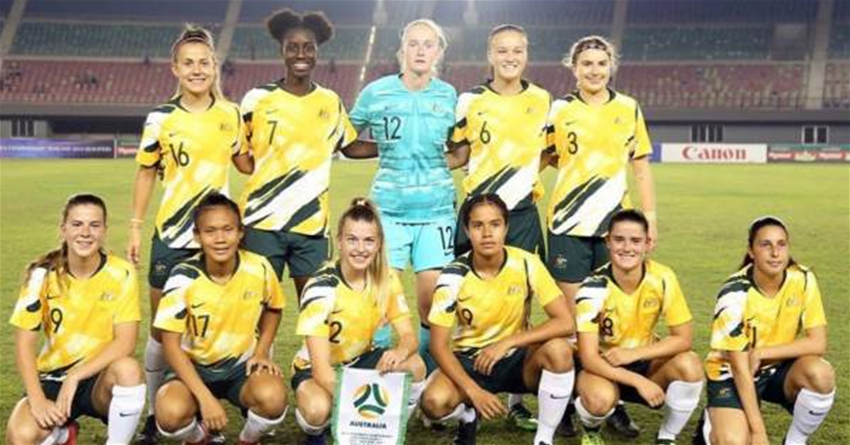The Young Matildas set-up need to ask themselves a few questions after a deja-vu inducing 5-1 thumping at the hands of North Korea in their opening AFC U/19 Championship match. Here are our suggestions for a few of the answers...
Older, wiser but not wise enough
This match was a particularly interesting insight into the youth development of both Australia and North Korea, following the Junior Matildas' 3-0 drubbing at the hands of the PRK in the AFC U/16 Championship less than a month ago.
Unlike the Juniors, who were thoroughly outplayed across the entire pitch in September, the Young Matildas put up more of a fight...at least at the beginning.
In a woman-on-woman scenario, we're a solid match for North Korea, who it should be remembered are a renowned powerhouse of the sport at this level.
Tactically, Leah Blayney's squad offered a more substantive approach, at times. This is no particular shot at Rae Dower - the intelligence to put a strategy into place is, as you would expect, far more developed. But any cohesiveness was very short lived.
But similar to the Juniors, we ran into familiar problems. A lack of oversight defensively meant we were far too easily entrapped in predictable overlapping runs out wide. Between the 15th and 30th minutes, North Korea burst through our shellshocked defensive line in wide positions so often, and with such repeatability, it actually became a little hard to watch.
Then there was the eventual collapse. From 2-1 down and a fairly stable, sometimes exciting progressive approach until the 74th minute, to a 5-1 loss as the heavens both literally and metaphorically broke loose.
A poor finish to the match and a poor start to the tournament.
A team of individuals
If there is one positive to take from a shellacking, it's the individual technical quality of our players. As noted, North Korea is a standout in this age group and the epitome of Asia's incredible knack of developing well-rounded, exciting young prospects.
But the Young Matildas could match them woman-on-woman. It's no less than should be expected, given this team possessed (arguably) some of the finest young players in the world.
Bags of Matildas experience and World Cup look-ins shouldn't be underestimated and as a result, the expectations rise accordingly. While defensively we were thoroughly outplayed in the first half, that resolute stubborness appeared to work its way back into the team after half-time.
For our most competitive period of the match, the major problem appeared to be our link-play between midfield and attack.
Kyra Cooney-Cross, Mary Fowler and Susan Phonsongkham were all guilty of going alone too regularly, attempting to dribble through mutiple opponents and more often than not, leaving holes and creating dangerous counter-attacking opportunities for Korea.
This was not, however, entirely their fault. Fowler particularly was offered very little support at key moments, often left to her devices somewhat inexplicably given the Young Matildas were chasing the game.
Pace is our biggest weakness
We were generally crucified on fast-breaks and counter attacks by a fast-paced, ruthlessly efficient Korean team. They attacked with poise and regularity, knowing they could exploit the same weakness time after time.
What they lack in spontaneity, the Koreans more than make up for in considered, tactical fluidity. They play at a high tempo consistently, which allowed them to wear down the Young Matildas and eventually have their way in a walkover.
Playing at a high tempo for an entire match is only possible when everybody knows their roles like the back of their hand.
Even when the Young Matildas were competitive, it was due to the heroics of Chelsea Blissett, who saved five or six scoring opportunities early in the second half. It's no coincidence that after her withdrawal, we shipped two quick goals.
We must be able to learn from defeats like these. First and foremost, our defensive resilience needs to be greater: our susceptibility to fast-paced counter attacks has seemingly become systemic and needs to be looked at as a matter of urgent priority if we are to
a) qualify for youth World Cups and...
b) make an imprint when we get there.
There's no doubting our individual quality, which is why constructive criticism is crucial. Due to the way our youth system, various competitions and clubs are organised, we are always going to possess greater individualism.
But we're currently making that look like a weakness, when we clearly have the talent for it to be a strength. Hopefully these two losses in very similar circumstances to North Korea can be treated with the significance they deserve.
Related Articles

Bonmati leads Spain to comeback win over Japan

Much-changed Spain knock Albania out of Euro 2024
.jpeg&h=172&w=306&c=1&s=1)












